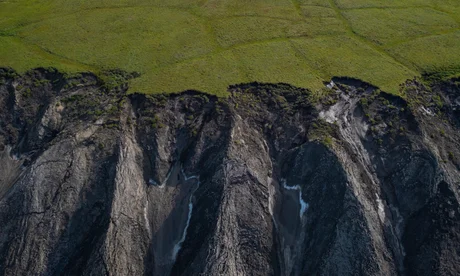A new study has found that a third of the Arctic’s tundra, forests and wetlands have become a source of carbon emissions, as global heating ends thousands of years of carbon storage in parts of the frozen north.
For millennia, Arctic land ecosystems have acted as a deep-freeze for the planet’s carbon, holding vast amounts of potential emissions in the permafrost. But ecosystems in the region are increasingly becoming a contributor to global heating as they release more CO2 into the atmosphere with rising temperatures, a new study published in Nature Climate Change concluded.
More than 30% of the region was a net source of CO2, according to the analysis, rising to 40% when emissions from wildfires were included. By using monitoring data from 200 study sites between 1990 and 2020, the research demonstrates how the Arctic’s boreal forests, wetlands and tundra are being transformed by rapid warming.
“It is the first time that we’re seeing this shift at such a large scale, cumulatively across all of the tundra. That’s a pretty big deal,” said Sue Natali, a co-author and lead researcher on the study at the Woodwell Climate Research Center.
The shift is occurring despite the Arctic becoming greener. “One place where I work in interior Alaska, when the permafrost thaws, the plants grow more so you can sometimes can get an uptick in carbon storage,” Natali said. “But the permafrost continues to melt and the microbes take over. You have this really big pool of carbon in the ground and you see things like ground collapse. You can visually see the changes in the landscape,” she said.
The study comes amid growing concern from scientists about the natural processes that regulate the Earth’s climate, which are themselves being affected by rising temperatures. Together, the planet’s oceans, forests, soils and other natural carbon sinks absorb about half of all human emissions, but there are signs that these sinks are under strain.
The Arctic ecosystem, spanning Siberia, Alaska, the Nordic countries and Canada, has been accumulating carbon for thousands of years, helping cool the Earth’s atmosphere. In a warming world, the researchers say that the carbon cycle in the region is beginning to change and needs better monitoring.
Story was adapted from the Guardian.
